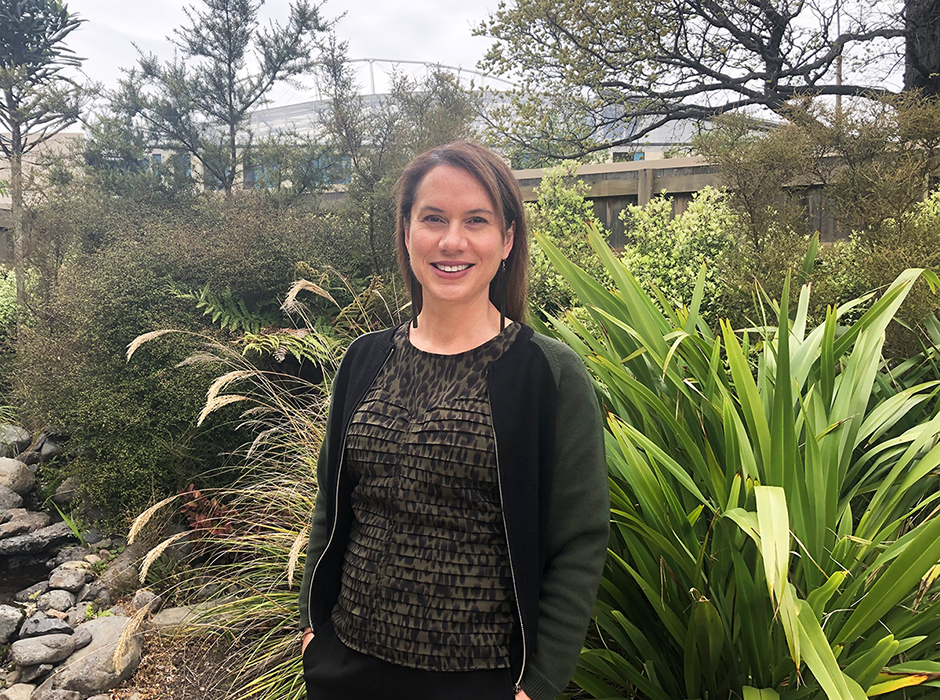
Associate Professor Moana Theodore (Ngāpuhi), the new Director of the Dunedin Study.
Associate Professor Moana Theodore (Ngāpuhi) has been appointed as the new Director of the Dunedin Multidisciplinary Health and Development Study (the Dunedin Study) following the retirement and recent death of Emeritus Distinguished Professor Richie Poulton (CNZM, FRSNZ).
As only the third Director in 51 years of the Dunedin Study, Associate Professor Theodore says she recognises the honour and responsibility of leading a Study that’s not only globally-recognised, but is also a national taonga (treasure).
The Dunedin Study was founded by Dr Phil Silva (OBE) with the support of Dr Patricia Buckfield in 1972-73. Dr Silva directed the Study until 2000, when Professor Poulton became the Study’s Director. Associate Professor Theodore’s first involvement with the Dunedin Study was in 1998, when she was employed by Dr Silva as an interviewer for the age-26 assessment phase. She then returned to the Dunedin Study in 2010 for a post-doctoral fellowship mentored by Professor Poulton.
“Both Phil and Richie were mentors and supported me from the very start of my career, reinforcing key Study values,” Associate Professor Theodore says. “Most importantly that we treat the Study members the way that we would want to be treated ourselves, because they are the true heroes of the Study.”
“The Dunedin Study would not be possible without the Study members who are the centre of the Study and who freely give the gift of information about their lives to benefit others. Without that ongoing generosity of the Study members and their families, the Study would not have the long-term impact that it does.”
Associate Professor Theodore has held several leadership and governance positions within the University and beyond. In addition to serving as a long-time member of Te Poutama Māori, the University’s Māori academic staff caucus, she has been co-director of the National Centre for Lifecourse Research since 2016. She was Deputy Director of the Ageing Well National Science Challenge (2017-18), a Councillor of the Royal Society Te Apārangi (2018-21) and a Ministerial-appointed board member of the Southern District Health Board from 2019-22.
Associate Professor Theodore recognises the importance of the Study to the University and the tremendous support provided over the last 50 years, including the Study’s purpose-built research facility that opened in 2016. She adds the Study is an excellent example of the ‘town-gown’ relationship.
“The Dunedin Study has at its heart the people of Dunedin, who from the earliest stages provided interviewers, encouraged their children to attend assessments, and have stood by the Study for 51 years. It has been overwhelming for myself and the team to feel the outpouring of aroha (love) from the Dunedin community for Richie and the Dunedin Study as we have grieved for our friend and mentor.”
Professor Jamin Halberstadt, Head of Department of Psychology, says Professor Poulton was one of a kind, a rare polymath who could work effectively across academic, political, and social contexts.
“Richie’s success at the helm of the Dunedin Study was as much due to his social strengths as to his scientific prowess,” Professor Halberstadt says. “Importantly, he knew how to take care of the Study’s participants and staff, and how to navigate often frustrating financial mechanisms to keep the Study thriving. Richie also never lost sight of the fact that science is for real people. He made sure the study kept giving back to New Zealand and the world through allied translational research projects and influence on government policy such as those targeting child poverty.”
Associate Professor Theodore’s research expertise includes lifecourse epidemiology, Māori health, child development, and the development of chronic disease. She is a former HRC Māori Health Research Emerging Leader Fellow and HRC Erihapeti Rehu-Murchie Post-doctoral Fellow.
“Lifecourse studies, like the Dunedin Study, provide strong evidence about the importance of experiences in early life for later health and wellbeing outcomes,” Associate Professor Theodore says. “A lifecourse approach aligns with worldviews that are expansive and long-term, connecting lives across generations.”
Professor Halberstadt says Moana’s appointment as the Study’s Director is perfect for building on the success of the Study to date, and importantly, to take it in exciting new directions.
“Like Richie, Moana is comfortable and effective in diverse social, professional, academic, and political settings, and yet has a style all her own: proof that leadership and greatness come in many forms,” Professor Halberstadt says. “I think everyone is excited to see the new perspectives, ideas, and questions she will bring to the Study as it moves into a new era.”
In 2022 the Dunedin Study celebrated its 50th anniversary, representing five decades of both local and global research impact. At the time, the most recent assessment of Study members aged 45 resulted in the participation of 94.1 per cent of living members, making it the highest follow-up rate for a study of this design and duration, anywhere in the world.
Building on this long-term commitment and the strong foundation created over the first 50 years of the Dunedin Study, preparations are now well underway for assessment phase 52 (when Study members are age 52 years) to begin in April 2024.
Associate Professor Theodore says the small team of committed long-serving Dunedin Study staff will preserve the legacy laid down by Professor Poulton, Dr Silva, and all past researchers.
Kōrero by Guy Frederick (Communications Adviser Sciences)